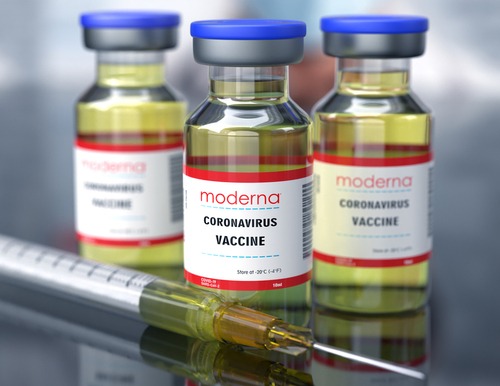
Moderna, Inc. reported initial data this week showing that in phase two testing, its mRNA COVID-19 vaccine proved effective and well-tolerated as a booster or a single 50 µg dose on the previously vaccinated, against both the original SARS-CoV-2 strain and two variants of concern.
In all, three strategies for boosting neutralizing titers were tested in the trial: mRNA-1273.351, a booster based on the B.1.351 variant first identified in the Republic of South Africa; mRNA-1273.211, a multivalent booster which combines a 50-50 mix of mRNA-1273, Moderna’s original, authorized vaccine, and mRNA-1273.351 in a single vaccine; along with a 50 µg booster dose of mRNA-1273.
The drugs were pitted against SARS-CoV-2 and the new South African and Brazillian strains, which have raised concerns worldwide for their potential vaccine resistance and deadly capabilities. A booster dose of mRNA-1273.351 achieved higher neutralizing antibody titers against the South African strain than a booster dose of the original mRNA-1273.
“As we seek to defeat the ongoing pandemic, we remain committed to being proactive as the virus evolves,” Stéphane Bancel, CEO of Moderna, said. “We are encouraged by these new data, which reinforce our confidence that our booster strategy should be protective against these newly detected variants. The strong and rapid boost in titers to levels above primary vaccination also clearly demonstrates the ability of mRNA-1273 to induce immune memory.”
The mRNA platform, according to Bancel, allows for rapid design of vaccine candidates, such as these boosters, that take on key virus mutations to allow for faster development of alternative, variant-matched vaccines if needed. COVID-19 has proven that to be the case.
Before testing, participants in the trial were tested approximately 6-8 months after their original vaccination efforts. Titers remained high against the original SARS-CoV-2 virus. Still, against variants, such resistances were much lower, with around half of the participants presenting titers below the assay limit of qualification before boosting. After two weeks post-booster, however, these titers saw increases in all participants and against all variants.
Most adverse effects were mild or moderate, mostly contained to effects like headaches and fatigue. Data on the multivalent vaccine candidate, mRNA-1273.211, and a lower dose of mRNA-1273.351 are not currently available but are expected soon. A paper with preliminary results was submitted as a preprint to medRxiv.




